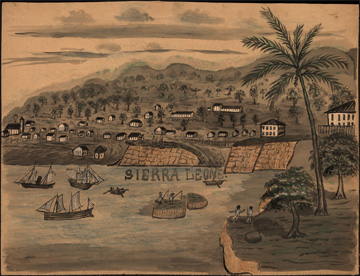Thomas Peters 18th c. — ?

Throughout the Atlantic world, enslaved men were able to gain freedom through military service. Thomas Peters displayed leadership during the American Revolution, in Nova Scotia (Canada) and in Sierra Leone, West Africa.
When the British offered freedom to slaves who fled their rebel (American Patriot) masters, Thomas Peters escaped from his owner, William Campbell of Wilmington, North Carolina. Eventually, Peters made his way to New York, where he joined the Black Pioneers Company of the British Regiment of Guides and Pioneers. Wounded twice in battle, he continued to fight against the American Continental forces until the end of the war. Thomas Peters’s military service earned him a certificate of freedom, which allowed him to board a British ship evacuating New York, on route to Nova Scotia in 1783.
Black and white loyalists who migrated to Nova Scotia competed for land grants and other resources. In Annapolis County, Thomas Peters pressed authorities to provide land grants that had been promised to black war veterans. Harsh conditions forced many veterans to perform roadwork in order to receive food rations. After the governor of Nova Scotia continued to delay land grants, Peters took action and wrote a series of petitions to government officials, seeking a solution to their grievances.
Frustrated by discrimination and delay, Peters decided to travel to England to advocate for the black community of Nova Scotia. When he arrived in England, he met abolitionists and members of the Sierra Leone Company. Peters negotiated with the company to allow the black immigrants of Nova Scotia to settle in Freetown, Sierra Leone.
Peters returned to Nova Scotia with John Clarkson, brother of abolitionist Thomas Clarkson, to recruit people for the Freetown relocation with the promise of a better life, land grants, education, self-government, equality with whites, and Christian missionary work. Peters and Clarkson convinced hundreds of people to board a fleet of ships destined for Freetown in January 1792. They arrived in March.
Upon their arrival, the black immigrants and Clarkson were surprised and angered to learn that the Sierra Leone Company’s board members had broken many of their promises. Thomas Peters was at the forefront of leadership and protest. The crisis fractured Peters and Clarkson’s relationship. In a letter, Clarkson described Peters as a troublemaker and a threat to his authority. Soon thereafter, Peters died—before he could secure a better life for those he had brought to Sierra Leone.







